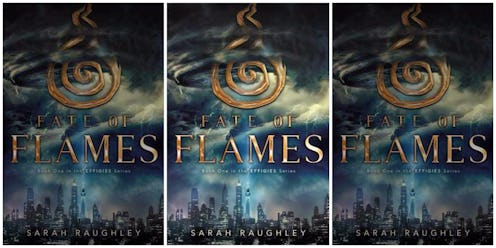Books
'Fate Of Flames' Is The Diverse Fantasy I Needed

Settle in, everyone, because I need to talk about a book I love. Fate of Flames by Sarah Raughley was described as Sailor Moon meets Pacific Rim meets The Avengers. And the novel delivers on that promise, giving us a quartet of women who have to use their elemental powers to fight giant creatures of mysterious origin known as Phantoms. The teenagers are all called Effigies, and, when one Effigy falls, a replacement is awakened with the same powers as her predesessor to carry on the war. Enter Maia Finley, who, a couple weeks prior to the start of the book, awoke as the Effigy of Fire. What captured my attention about the novel wasn't just the plot, as awesome as it was. It was the fact that the four Effigies, Maia Finley, Chae Rin Kim, Belle Rousseau, and Victoria "Lake" Soyinka, are far more diverse than simply being the straight, white males I was used to from superhero movies.
Fate of Flames by Sarah Raughley, $12.66, Amazon
Women of color may not feature in meaningful roles as often as their male counterparts, or as often as white women, but if you flip through enough comics then you can name a few off the top of your head: America Chavez, Storm, Amanda Waller, and Renee Montoya come to mind for me. However, in the films that I've been shelling out my money on since 2008's Iron Man, good luck playing spot the WOC in the monochrome casts. It's disheartening at best, and offensive at worst.
But then I open a highly-anticipated book like Fate of Flames and find that Maia is biracial and part-Jamaican, that Chae Rin is Korean, that Lake is British-African, and that Belle, the white blonde member of the team, is in the minority there. Even before I finished the book, I was touched by the representation. By the confirmation that someone somewhere believes that women who look like me can be heroes. Because that's what's lacking from the superhero movies that I consume: that validation.
Oh, we have confirmation that women can be heroes. White women. Black Widow might still be languishing without her own solo film, but Wonder Woman is about to break onto the big screen, and Captain Marvel is going to lead a solo movie of her own. What do all these women whose solo films I've been fervently wishing to see have in common? They're all white. Even when we do get some progress — the rumor that Zendaya might be playing Mary Jane in the upcoming Spider-Man reboot and the announcement that Kiersey Clemons has been cast as Iris West in the upcoming Flash solo film — we slide backward in subtle insiduous ways.
Like when Jubilee was advertised as a major player in X-Men: Apocalypse , yet was inexplicably left behind when her white friends Kurt, Jean, and Scott went off to help save the day. Like when Katana was the most underdeveloped member of the Suicide Squad, and more characters of color were killed during that film than white characters. Like when the response to Zendaya's potential role was backlash from comic book fans deriding a politically correct Hollywood changing the races of characters, as if the world would stop if there wasn't yet more white woman on the big screen instead of a black one.
Fate Of Flames normalized the idea of a diverse team of superhero women. Their skin colors aren't made the whole focus of the novel or their personalities. Maia casually mentions in all of two conversations that she has a Jamaican grandparent, and Lake's British idioms receive more attention than her dark skin. It could be said that there's no point in representation if it isn't heavily and thoroughly stated so that there can be no doubt in anyone's mind that the character they're dealing with is a character of color, but Fate Of Flames challenges that notion with its subtlety.
After all, despite Rue being repeatedly stated to be black, there was a host of people who complained of Amandla Stenberg's casting in Hunger Games because they'd always thought Rue was white. Whether you state it on every other page, or only bring it up when natural and relevant, people will read their own meanings into these characters. And, obviously, I have read my own meanings into Maia, Chae Rin, Belle, and Lake.
So, here is what they are to me: multiethnic, multicultural, flawed, realistic, strong female characters whose strength comes entirely from the fact that not a single one of them wants to be saving the world, and most of them are barely capable at doing so, but every single one of them tries. Every time. No matter the issue or the emergency. No matter how long it takes, how they doubt themselves, how they fight with one another, or how much they want to quit. Every single one of them are heroes for the sheer fact that they know they're the only ones who can do their jobs, and force themselves to do it no matter how hard it gets. And, believe me, it gets hard.
And all of them are heroes in real life because they give a broad range of women from a broad range of ethnicities the opportunity to read a book and see someone who looks like them doing things they wish they were brave enough to do. They inspire us, teach us, and even make us cringe when they make the wrong choices. They represent us, in a genre where we don't often get representation at all — let alone well-written representation.
Above all else, I will always love Fate Of Flames for giving me this validation, and I eagerly look forward to the rest of the series. Maybe one day the movies will catch up to this book.
Fate of Flames by Sarah Raughley, $12.66, Amazon
Images: Simon & Schuster Canada; Giphy